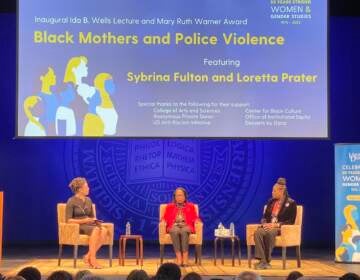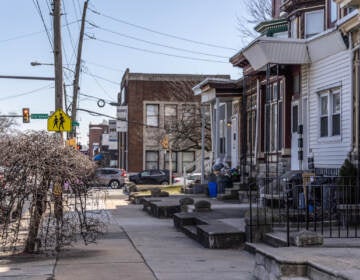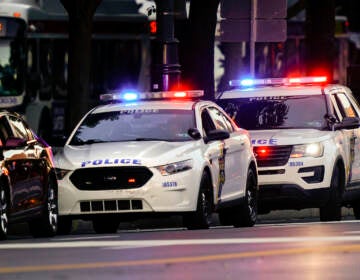Overcoming police brutality starts with positive community interaction
I have learned to not view all officers as "bad cops." However, society does not understand that we cannot say #AllLivesMatter until everyone understands #BlackLivesMatter.

Police officers watch as protesters pass by Philadelphia's City Hall in May. (Bastiaan Slabbers/for NewsWorks, file)
Speak Easy presents a public discussion about strengthening the relationship between the police and the communities they serve. Seeking diverse perspectives, NewsWorks is hosting a public forum, “Police and Community Cooperation,” on Nov. 17 at WHYY studios. Registration is free at whyy.org/speakeasy.
—
America is seeing a police brutality epidemic that stems from racism. It seems like every time I log on to social networks or turn on the news, there is another story about victims of police brutality who are neither thugs nor criminals. They are scholars, women, children — forced to deal with a cruel justice system.
Sandra Bland and Tamir Rice are among many other unarmed citizens who have been murdered at the hands of America’s law enforcement. The police involved in both incidents did not face the same consequences that a civilian would. Their actions are almost always justified by the same law that is supposedly designed to protect us. According to copcrisis.com, less than 1 percent of police officers were indicted for murders they committed.
Taught to distrust
Before the SecuringOurFuture initiative, most of my experiences with police officers were negative. Two experiences in 2010 affected my life the most: the police beating of my Uncle John and the murder of my friend Anthony.
John was a law-abiding citizen who owned a bar. Every night after the bar closed, he walked his bartenders to their cars. One night in March of 2010, the police stopped him for no apparent reason. They asked him if he had any weapons. He told the officers that he was licensed to carry the concealed firearm in his possession. (He had purchased the gun after he and my disabled cousin were robbed at gun point outside of his establishment.) Even after providing proper documentation of legal ownership and concealment for the gun, the police officers struck my uncle numerous times.
The next day, after school, I stopped by the bar after school to check on my uncle. I was horrified at what I saw. My uncle was a dark skinned man, but his skin was covered in purple and blue bruises. His face and arms were swollen. One eye was completely shut, and the other was an excruciating red; I was in complete shock.
To make matters worse, about a week later, my friend Anthony, who was diagnosed with an intellectual disability, was shot and killed right outside on the street I live on.
These two incidents exposed me to a cruel reality that I was not prepared to face. I expressed this disgust to my Summer Search mentor. He could not understand why I despised the police so much — until he experienced police brutality, himself, in New York City during the Occupy Wall Street protest. After the protest, he told me that he and others were maced and handled forcefully.
Breaking the silence
As a society, we go wrong when our voices and cries are unheard by the judicial system, politicians, judges and Americans at large. Our voices have been muffled by law enforcement for decades. In 2010, statistics from a report by copcrisis.com showed that only a small fraction of 17,000 law enforcement agencies track misconduct reports. The report was based on statistics that were voluntarily given by only 5 percent of the police departments here in the United States.
As a society, we go wrong when we are allowing murderers to walk freely. How can we believe in a system that is not and was never meant to protect us?
In every situation, where there are race factors, the victims are criminalized in the media. The media will use the best picture of the officer and the most unflattering picture of the victim. Images of Trayvon Martin, Eric Garner and Michael Brown in the news show how racist and unjust America’s media outlets are towards people of color.
Through Facebook, Twitter, and Instagram, people of color are able to convey our messages. These social networks allow us to tell our stories from our own perspectives.
There is a lack of representation in the Philadelphia Police Department. There should be racial and gender representation that reflects Philadelphia’s population. There are more white police officers patrolling impoverished neighborhoods who do not make an effort to understand the lives of the people they serve. The officers only interact with the community when they are arresting someone. Society does not empathize with the African-American experience, nor do they understand that we cannot say #AllLivesMatter until everyone understands #BlackLivesMatter.
Good cops, bad cops
Since SecuringOurFuture, I have learned to not view all police officers as “bad cops.” I met so many cool police officers at the SecuringOurFuture conferences. I wanted more people to experience what I experienced, so I reached out to the Philadelphia Commission on Human Relations to have some of the police officers join us at the Education Day (E! Day) back-to-school kick-off event in August.
SecuringOurFuture helped change young peoples’ attitudes towards officers. I was able to see them from a different perspective by talking with them. I wish more officers would participate in opportunities like SecuringOurFuture and E! Day, to interact with the community in a positive way.
There is more to being a cop than patrolling the neighborhoods. Rather than staying their vehicles, they should interact with neighbors more. I would like to see police officers smile once in a while. We have to change the negative connotation of policing in our communities. The only way to do so is by starting with activities with children and teenagers. It should be mandatory for police to contribute some hours every month.
I would love to see life, liberty and justice for all, but the Pledge of Allegiance and the American Dream were not made for African Americans. History is repeating itself. Why are we still protesting and marching for equality and justice 50 years after the Civil Rights Movement? How many times we have to march and create hashtags to receive national attention? In order to overcome these obstacles, we have to rebuild America’s justice system.
—
Nadiyah Young is a recent sociology and communication studies graduate from East Stroudsburg University. She participated in the SecuringOurFuture summit last spring, convened by the Philadelphia Commission on Human Relations, the Philadelphia Police Advisory Commission, My Brother’s Keeper Philadelphia, and the Mayor’s Office on Immigrant and Multicultural Affairs. She serves as a SecuringOurFuture youth ambassador.
WHYY is your source for fact-based, in-depth journalism and information. As a nonprofit organization, we rely on financial support from readers like you. Please give today.





